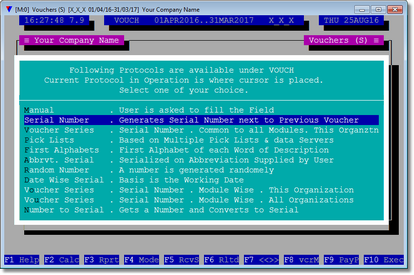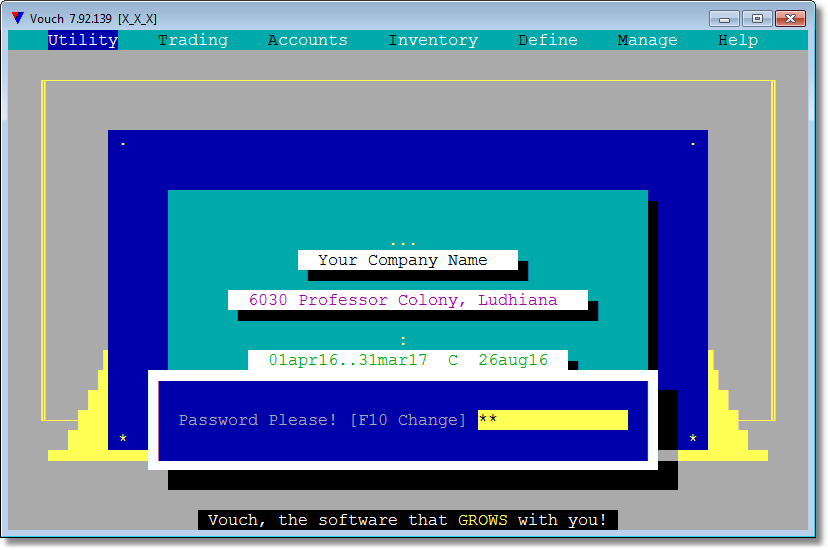
We will discuss the various properties of the modules in this topic.
Vouch implements two types of modules.
Solitary - Single TableWhere data is fetched in a single form and is populated primarily in a single table. Terms "single" and "solitary" are used interchangeable throughout Vouch documentation in reference to modules Relational - Parent/ChildWhere data is fetched in many-to-one fashion in a two-part form and is populated primarily in two tables. These are also called parent/child modules. The terms "relational" and "parent/child" are used interchangeably throughout in Vouch documentation in reference to modules. In relational modules transactions are fetched as many times as needed in a browser, called the child. Parent's fields can be distributed before and/or after child entries. |
Vouch implements two types of modules by nature.
MasterA 'master' module is one where each record represents a unique piece of information, i.e., Customers, Vendors, General Ledger, etc. A 'master' record can be referenced in as many other modules as needed. A 'master' record, besides any other information, contains a field of nature CODE and, ususally, a field of nature DESCRIPTION at the least. TransactionA 'transaction' module is one which records day-to-day business transactions of a particular area of operations, i.e., Vouchers, Sales, Purchases. A 'transaction' record, beside other relevant fields, has a field of nature SERIAL and a field of nature TRANSDATE. |
One of the very useful feature of Vouch is the capability to re-configure the primary-key protocol. By default all modules of nature MASTER implement a field of nature CODE as its primary-key. And modules of nature TRANSACTION implement a field of namture SERIAL.
At times it is desired that a different behavior of populating primary-key be employed, usually, in modules of nature TRANSACTION. Vouch offers the following protocols:
Module > More > Define > Primary Key Protocol
|
Vouch implements a unique way to restrict access to the Vouch resources. A module is a primary resource indeed. Most data-recording modules are not restricted by default except for some module-groups which are of strategic importance. The modules which are used to record configuration details are restricted for sure.
In any circumstances, Vouch admin has an unrestricted access to any of the resource. |
Vouch implements execution codes (shortcuts) to run a module or some utility. The execution codes can be restricted per user basis. The execution codes can be grabbed from here. How to executePress Alt+P. You will be presented with the following dialog, and enter execution code - A1 - for module - Vouchers . Single. You will be carried to that module. Note that execution code is not case sensitive. You can use both a1 or A1. You can execute this process from anywhere in Vouch. |
 State of Tables on Closing Financial Period
State of Tables on Closing Financial Period
Vouch implements protocol to close the financial period as per govt guidelines. When period is closed, all data tables constituting a module are copied to a period referenced separate folder which can be accessed from within Vouch anytime as needed. The data tables in current period are kept unchanged OR emptied OR altered based on its inherent nature. Usually modules of type MASTER are retained AS-IS, modules of type TRANSACTION are EMPTIED, and some MASTERs undergo some sort of updation process, i.e., General Ledger. |
Modules o nature TRANSACTION can be linked with Accounting backbone of Vouch. By default only few, dedicated-to-purpose, modules are linked with Accounts. For example, Vouchers . Single and Sales. Modules documentation will display this attribute as 'Yes' under the head - Linked with Accounts. |
Modules o nature TRANSACTION can be linked with Inventory backbone of Vouch. By default only few, dedicated-to-purpose, modules are linked with Inventory. For example, Sales and Purchases. Modules documentation will display this attribute as 'Yes' under the head - Linked with Inventory. |
The modules of type RELATIONAL will always have a 'CHILD' table ( or a read-only module ). A child module can only be accessed from withing its parent module. The access point is <F5 Dtel>. If accessed via F5 Dtel, the module becomes read-only, means, you cannot add/edit/delete records from within its interface options. However, you are allowed to configure various aspects of module. |



